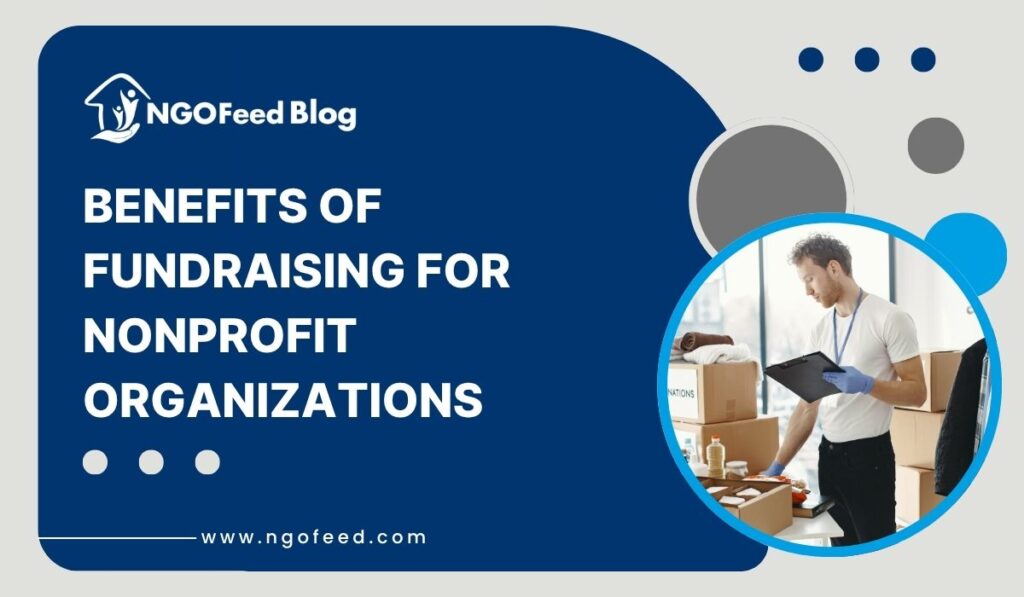At the center of nonprofit sustainability and expansion is fundraising. Effective fundraising goes far beyond just a way to guarantee basic financial means; it acts as a spark for mission advancement, community involvement, and institutional resiliency. Nonprofit groups may not only support their projects and services by creating effective fundraising plans but also create enduring connections with donors, volunteers, and stakeholders that share their vision for social change.
Understanding the many advantages of fundraising is absolutely vital for nonprofits to prosper in a changing and competitive philanthropic landscape. From financial stability to greater visibility and community empowerment, this paper examines the many benefits fundraisings offers nonprofit groups. By emphasizing these advantages, nonprofits may come to better understand the strategic value of fundraising in accomplishing their mission and generating long-term effects.
Table of Contents
Also Read: Gamification in Volunteering
1. Financial Sustainability
Fundraising provides the essential financial resources nonprofits need to implement programs, pay staff, purchase materials, and cover administrative costs. A strong fundraising strategy ensures continuity of operations, even during periods of economic uncertainty or shifting government priorities.
“No mission can be fulfilled without means.”
2. Expansion of Programs and Services
With increased funding, nonprofits can scale up existing programs, launch new initiatives, expand into underserved areas, and reach more beneficiaries. Fundraising allows organizations to grow strategically and sustainably.
3. Community Engagement and Support
Fundraising creates an opportunity to engage with the community and build a base of loyal supporters, volunteers, and advocates. Events, campaigns, and donor communications foster a sense of belonging and shared purpose.
Also Read: Donor Retention Strategies for NGOs
4. Enhanced Visibility and Credibility
Fundraising campaigns—especially those run on public platforms—enhance the organization’s visibility, reputation, and public trust. A nonprofit that can raise funds transparently is seen as legitimate, effective, and community-centered.
5. Donor Relationships and Partnerships
Fundraising helps build long-term relationships with individuals, corporations, foundations, and government agencies. These relationships can evolve into strategic partnerships that go beyond fundingsuch as mentorship, in-kind support, or advocacy collaborations.
6. Innovation and Flexibility
Unrestricted funds raised through individual donations or CSR allow nonprofits to experiment with innovative ideas, respond to emergencies, or address new needs without being tied to rigid grant conditions.
Also Read: How to Approach Corporate CSR for NGOs
7. Empowered Teams and Organizational Morale
When funding is available, staff and volunteers feel more secure and motivated. Resources can be allocated for training, leadership development, and team building, which improves overall performance and morale.
8. Accountability and Professionalism
Fundraising demands proper planning, reporting, and communication. These processes build a culture of accountability, strategic thinking, and professionalism within the organization.
9. Leverage for Additional Funding
Strong fundraising results, donor confidence, and financial documentation can help leverage matching funds, secure government grants, or attract investors to social enterprises.
10. Mission Fulfillment and Lasting Impact
Ultimately, successful fundraising ensures that a nonprofit can stay true to its mission, deliver on its promises, and create long-term impact in the lives of individuals and communities it serves.
Also Read: How to apply for CSR Funding in India?
Summary Table: Benefits at a Glance
| Benefit | Outcome |
|---|---|
| Financial Sustainability | Continuous program delivery and stability |
| Program Expansion | Reach more beneficiaries |
| Community Engagement | Stronger local and global support base |
| Visibility and Credibility | Greater public trust and recognition |
| Partnerships and Networks | Long-term collaborations |
| Innovation Flexibility | Adaptive and creative problem-solving |
| Team Empowerment | Higher motivation and performance |
| Accountability | Professional practices and reporting |
| Leverage for More Funding | Easier access to larger or matching funds |
| Mission Fulfillment | Realization of social and developmental goals |
FAQs
Q1: Why is fundraising important for nonprofit organizations?
Fundraising is essential because it provides the financial resources necessary to run programs, expand services, and fulfill the nonprofit’s mission. Without consistent funding, sustaining impact becomes difficult.
Q2: Besides money, what other benefits does fundraising offer?
Fundraising builds stronger community relationships, raises public awareness about the cause, engages volunteers, and can enhance the organization’s credibility and influence.
Q3: How does fundraising help build trust?
When nonprofits actively engage with their supporters and transparently communicate fundraising goals and outcomes, they build trust and demonstrate accountability to donors and beneficiaries alike.
Q4: Can fundraising support long-term sustainability?
Yes. A strong fundraising program, especially one that focuses on cultivating recurring donors, helps ensure the nonprofit has stable resources for long-term planning and growth.
Q5: Is fundraising only about big donors?
Not at all. Every contribution counts. Small donations, crowdfunding campaigns, and community-based giving can be just as impactful as large gifts, particularly in creating broad-based community support.



